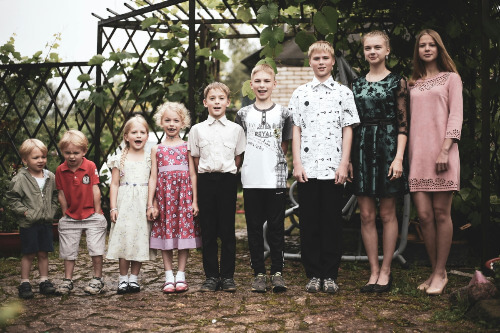The Qualities, Responsibilities and Rewards of Becoming a Foster Parent
Becoming a foster parent involves a mix of challenges and rewards, impacting the lives of vulnerable children in significant ways.
 Nine foster kids standing and facing camera, they are lined up from tallest to shortest.
Nine foster kids standing and facing camera, they are lined up from tallest to shortest.It requires qualities like compassion, dedication and the ability to offer stability and love to children who have faced hardships.
When we become foster parents we step into an unselfish role, providing care for children who cannot stay with their biological families due to various reasons such as abuse or neglect.
We'll discuss what it means to be a foster parent, the qualities you need to have in order to be suitable for the role and the main responsibilities that will come with it.
What is a Foster Parent?
Someone who welcomes children into their hearts and homes temporarily when they cannot live with their biological families due to reasons such as abuse, neglect or a family crisis.
You will play a crucial role in creating a safe environment while the kids biological parents try to fix any issues that may be leading to their placement in foster care.
Eg. I can’t tell you the whole story or give any names (signed a confidentiality agreement). But, I can tell you that my girls came into care due to severe neglect, so did their brothers.
I couldn’t take them all, place not quite big enough, and there were not any other foster homes available to take all 4 siblings.
They were all severely neglected, abused by others, the place was not clean, and the kids were not being fed properly, etc.
The parents gambled any money they had and did not have enough left over to feed their children, they also did not have a place big enough for them all to live.
They had to take classes and so forth in order to get better in these areas, however, they failed the classes and their parenting privileges were revoked.
Qualities of a Foster Parent
1. Compassionate and Understanding: You must have a genuine sense of compassion and empathy for the children who are placed in your care.
You should be able to empathize with the hardships these children have endured.

2. Patience: Being patient is important when caring for children who might be facing behavioural challenges or emotional difficulties due to their past.
You should remain patient and understanding, offering support and guidance as the children progress through their healing process.
3. Flexibility: With foster parenting you need to expect the unexpected, such as many challenges and sudden changes.
You must be flexible and open to change, ready to adjust your routines and expectations so that you can meet the changing needs of the children in your care.
4. Advocacy: You need to act as advocates for the children you look after, ensuring that their voices are heard and their needs are met.
There are times when you may need to get through the welfare system, social workers, healthcare professionals and educators to successfully get what’s in the best interests of the child.
5. Stability: Providing a supportive and stable environment is crucial for the healthy growth of children in foster care.
You should provide consistency, routine and a sense of safety to help children feel secure and cared for.
6. Strength of Character: Being a foster parent can be emotionally challenging, requiring the strength to handle both the joys and challenges that come with it.
You should be able to manage stress and difficulties while staying dedicated to the well-being of the children in your care.
Responsibilities of a Foster Parent
1. Providing Basic Needs: As a foster parent you are responsible for meeting the children's basic needs in your care, like food, clothing, shelter and medical attention.
You are responsible for making sure that the children are living in a safe and welcoming home environment.
 Mom holding and hugging daughter who is holding her teddy bear. depositphotos.com
Mom holding and hugging daughter who is holding her teddy bear. depositphotos.com2. Emotional Support: You will need to offer emotional support and comfort to children who may be experiencing feelings of loss, confusion or trauma.
You should aim to foster an environment where children feel valued, respected and loved.
3. Promoting Development: You actively contribute to the physical, emotional and cognitive development of the children you are caring for.
You engage in appropriate activities based on the child's age, provide educational assistance and encourage positive social interactions.
4. Work with Professionals: You will be required to work closely with social workers, therapists, teachers and other professionals involved in the child's well being.
When working with them you will actively participate in meetings regarding the child's case, take part in appointments and maintain effective communication to ensure all aspects of the child's well being are met.
5. Support Reuniting Family: In most cases, reuniting family is the ultimate goal for the children.
You will play a crucial role in supporting this process by building strong connections with the child's biological family, arranging visits and actively engaging in efforts to reunite the family.
6. Advocacy and Legal Responsibilities: As a foster parent you will work to ensure that the children under your care receive the necessary services and support, advocating for their best interests.
You may also be called upon to attend court proceedings and provide an understanding of any decisions that impacts the child's well being
 Boy has fallen off his bike and hurt his knee. Foster parents are empathizing with him and the mom has her hand over his hands which are holding his knee as he pouts while looking up at her.
Boy has fallen off his bike and hurt his knee. Foster parents are empathizing with him and the mom has her hand over his hands which are holding his knee as he pouts while looking up at her.Becoming a foster parent is a meaningful way to positively impact the lives of vulnerable children.
It demands a special blend of qualities like empathy and understanding, including stability and care to children in need.
Though fostering comes with its share of difficulties, witnessing a child thrive and knowing you've contributed to their healing journey brings exceptional joy.
Do you have the qualities of a foster parent? Consider exploring this occupation, but only if you have these qualities.
Some people foster just to collect the checks and do nothing for or with the children. Please don't do that.
Instead make a positive impact on children's lives and in your community.
























New! Comments
Have your say about what you just read! Leave me a comment in the box below.